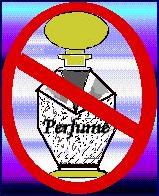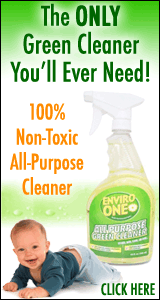 – compiled by "Breath of Fresh Air"
– compiled by "Breath of Fresh Air"
- Perfume today is not made from flowers but from toxic chemicals. It's about as romantic as hazardous waste.
- More than 4,000 chemicals are used in fragrances. Of these, 95% are made from petroleum.
- No agency regulates the fragrance industry, yet perfume chemicals are as damaging to health as tobacco smoke.
Some toxic chemicals found in fragrances:
Toluene, ethanol, acetone, formaldehyde, limonene, benzene derivatives, methylene chloride, and many others known to cause cancer, birth defects, infertility, nervous system damage, or other injuries. The EPA found chloroform as well in fabric softeners.
As Romantic as Hazardous Waste
Toluene was found in every fragrance sample collected by the U.S. Environmental Protection Agency for a 1991 report. "Toluene was most abundant in the auto parts store as well as the fragrance section of the department store." Toluene has been proven to cause cancer and nervous system damage and is designated as hazardous waste.
Not Just in a Perfume Bottle
There is a dramatic increase in people who are made sick by fragrances because so many products are now scented. Babies and children are even more vulnerable, as are people who are trying to recover from cancer and other illnesses.
Chemical fragrances are present in most laundry detergents, fabric softeners, anti-cling products, dish-washing liquids, disinfectants, soaps, shampoos and other hair products, deodorants, cosmetics, suntan/sunscreen lotions, aftershaves, colognes, incense, analgesic creams, and lip balms. Even products marked "unscented" often are falsely labelled and actually contain toxic fragrances.
Perfume Pollutes
Scents and Illness
Exposure to scented products can cause exhaustion, weakness, "hay fever" symptoms, dizziness, difficulty concentrating, headaches, rashes, swollen lymph glands, muscle aches and spasms, heart palpitations, nausea, stomach cramps, vomiting, asthma attacks (inability to breathe), neuromotor dysfunction, seizures, and loss of consciousness.
MCS (Multiple Chemical Sensitivities) is caused by overexposure to toxic chemicals. Even if you don't feel the effects yet, your health is still being damaged, and you will develop MCS or other illnesses if you continue to be exposed to toxic chemicals.
If you aren't already sick from chemical exposure and you're still using scented products, do you want to gamble on how much longer you have before your body can no longer cope with the toluene and other poisons in them?
DON'T LET YOUR INABILITY TO ELIMINATE ALL TOXINS FROM YOUR LIFE STOP YOU FROM DOING WHAT YOU CAN. If you are still healthy, efforts you make now can help you prevent getting chronically ill or getting MCS yourself. And you will save money by not using products that are unnecessary.
How to Protect Yourself and those with MCS from Further Chemical Exposure
- STOP USING ANY PRODUCT KNOWN TO BE TOXIC. Don't use any pesticides or herbicides ever. There are safer alternatives. Don't wear clothes that have been exposed to insect repellant, flea powder or spray, flea bombs, mothballs, or other poisons, especially around people with MCS, even if the clothes have been washed. If you feel you have to use insect repellents because of an illness which makes insect bites a danger to your health, keep distance from people with MCS and warn them. Be aware that insect repellents do not repel Lyme disease ticks.
- STOP USING ANY SCENTED PRODUCTS. Even if you think it's unscented, if friends say it makes them feel sick, believe them. If you've been using scented products on your clothes, know that it will take many washings and outdoor airings to make them safe, and that some scented clothes may never air out. Don't use "air fresheners" in your home or car; the scent stays on your clothes. Never use scented detergents, fabric softeners, or anti-cling products.
If you have a fireplace or wood-burning stove, don't use synthetic logs. Even though they're advertised as environmentally safer, they emit chemical fumes when burned. Don't burn plastic, cardboard, magazines, newspapers, or anything but clean, untreated dry wood. - IF YOU'RE STILL SCENTED, KEEP DISTANCE FROM PEOPLE WITH MCS. Don't approach or hug friends without warning them and asking them if it's alright.
- DON'T GET GASOLINE AT A SELF-SERVICE PUMP IF YOU'RE GOING TO VISIT SOMEONE WITH MCS.
- DON'T HAVE CLOTHES DRY-CLEANED. Don't wear clothes that have ever been dry-cleaned anywhere near people with MCS.
- BE AWARE THAT EVERY PUBLIC PLACE YOU VISIT ON THE WAY TO A FRAGRANCE-FREE EVENT OR A FRIEND'S HOME WILL ADD TOXINS AND SCENT TO YOUR CLOTHES. What we smell from petroleum-based perfumes are volatile chemicals which travel through the air and are sticky. If you have to take public transportation, if you have an errand to do, or if you're going to another event first, BRING A CLEAN CHANGE OF CLOTHES in clean, double plastic bags.
Some Safer Products
Fabric softeners, anti-cling products, disinfectants, other strongly-scented products, and most detergents have toxic ingredients. If you use hair mousse and gels, hairspray, or chemically process your hair, it will need many washings with a safe shampoo and the passage of time before you can be around someone with MCS without making them ill. What may seem a mild fragrance to you can be excruciatingly toxic to someone with MCS.
Listed on the Guidelines for Nontoxic Living page are a few of the many safer products available.
(NOTE: Ask friends with MCS which products are safe for them. The products each of us can tolerate vary from person to person.
Please be kind to yourself, the environment, and the people you love—especially those who have MCS.
(NOTE: The information provided on this page is based on the pamphlet, "No Perfume Means Healthier Air", distributed by "Breath of Fresh Air" – used by permission.









